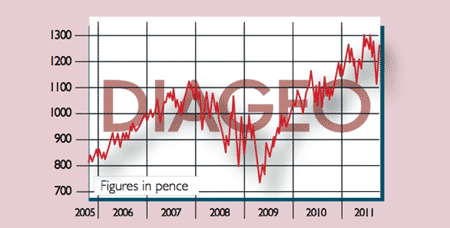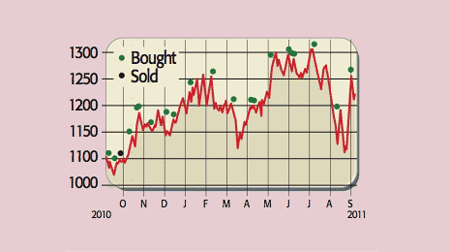Shares in focus: Diageo, a premium drinks giant
Diageo is the world's largest producer of premium alcoholic drinks with a cabinet full of well-known names. This is a quality stock, says Phil Oakley - but given its price, is now the time to buy?
Get the latest financial news, insights and expert analysis from our award-winning MoneyWeek team, to help you understand what really matters when it comes to your finances.
You are now subscribed
Your newsletter sign-up was successful
Want to add more newsletters?

Twice daily
MoneyWeek
Get the latest financial news, insights and expert analysis from our award-winning MoneyWeek team, to help you understand what really matters when it comes to your finances.

Four times a week
Look After My Bills
Sign up to our free money-saving newsletter, filled with the latest news and expert advice to help you find the best tips and deals for managing your bills. Start saving today!
What is Diageo?
Diageo is the world's leading premium alcoholic drinks business. Its leading brands include Johnnie Walker whisky, Smirnoff vodka, Baileys liqueur, Captain Morgan rum, Jos Cuervo tequila, Tanqueray gin, and Guinness. The company trades in more than 80 markets and had sales of £9.9bn in the year to June 2011.
What is the company's history?
Diageo was created through the merger of Guinness and Grand Metropolitan in 1997. Guinness can trace its history back to 1759 when Arthur Guinness opened a brewery in Dublin. Grand Metropolitan, on the other hand, began life in 1934 as a hotel company known as MRMA Ltd. It entered the spirits business during the 1970s via its purchase of International Distillers and Vintners. Guinness became a major player in spirits following its acquisition of Distillers Company in 1986. In 1988, Grand Metropolitan attempted to diversify by acquiring Pillsbury, which contained the major household brands of Hagen-Dazs, Green Giant and the Burger King chain. In 2000, Diageo sold its food businesses to concentrate on drinks. It gained further global scale by acquiring Seagram's drinks business in 2001.
Who runs Diageo?
Paul Walsh has been chief executive since 2000. He joined Grand Metropolitan's brewing business in 1982 and was previously CEO of Pillsbury. His total pay was £3.2m in 2010. Franz Humer is chairman and Deidre Mahlan is finance director.
MoneyWeek
Subscribe to MoneyWeek today and get your first six magazine issues absolutely FREE

Sign up to Money Morning
Don't miss the latest investment and personal finances news, market analysis, plus money-saving tips with our free twice-daily newsletter
Don't miss the latest investment and personal finances news, market analysis, plus money-saving tips with our free twice-daily newsletter
How's trading?
Quite good. Results for the year to June 2011 saw steady revenue growth of 5% to £9.9bn. This was due to a combination of volume growth, price increases and lower discounting. Premium vodka and scotches (increasingly popular in emerging markets) in particular saw very strong rates of sales growth. High operating margins of 29% were maintained with operating profits of £2.9bn. Lower interest and tax charges led to a 16.1% increase in earnings per share (EPS) to 83.6p and a 6% increase in the annual dividend to 40.4p per share.
What's the outlook for Diageo?
The company is quite bullish about its medium-term prospects. It expects emerging markets and their rising numbers of middle-class consumers to account for 50% of group sales by 2015. Diageo believes that this trend can deliver 6% organic (non-acquisition-based) sales growth. Continued efficiency gains are aimed at increasing operating margins by 2% by 2014. If successful, Diageo should be able to achieve double-digit annual EPS growth over the period and accelerate the growth of dividend payouts.
The analysts
Of the 37 analysts surveyed by Bloomberg, 25 say "buy", ten "hold" and two "sell". The average price target is 1,374p 13% above the current share price. Most bullish is Kepler Capital with a 1,450p price target, whereas JP Morgan is most bearish with a 1,175p target. Our view: Diageo is a quality company, but the p/e isn't especially cheap. A good stock to buy if stockmarkets fall further one for the watchlist.
The numbers

Stockmarket code: DGE
Share price 1,215p
Market cap: £30.4bn
Net assets (June 2011) £6.0bn
Net debt (June 2011) £6.5bn
P/e (current year estimate) 13.8
Yield (prospective) 3.5%
Directors' dealings

There have been some modest purchases by Diageo directors during the last year the dates are shown on the chart. Most have been related to the exercising of options or company share plans. Notably, CEO Paul Walsh has been a net seller of shares. Diageo has share ownership guidelines that stipulate that the CEO and CFO must respectively holdat least 300% and 250% of their annual base pay in company shares.
Director and shares held
P Walsh: 150,000
D Mahlen: 12,084
F Humer: 3,336
A Fennell: 42,804
G Ghostine: 10,883
B Holden: 5,200
D Gosnell: 14,518
Get the latest financial news, insights and expert analysis from our award-winning MoneyWeek team, to help you understand what really matters when it comes to your finances.
Phil spent 13 years as an investment analyst for both stockbroking and fund management companies.
-
 ISA fund and trust picks for every type of investor – which could work for you?
ISA fund and trust picks for every type of investor – which could work for you?Whether you’re an ISA investor seeking reliable returns, looking to add a bit more risk to your portfolio or are new to investing, MoneyWeek asked the experts for funds and investment trusts you could consider in 2026
-
 The most popular fund sectors of 2025 as investor outflows continue
The most popular fund sectors of 2025 as investor outflows continueIt was another difficult year for fund inflows but there are signs that investors are returning to the financial markets